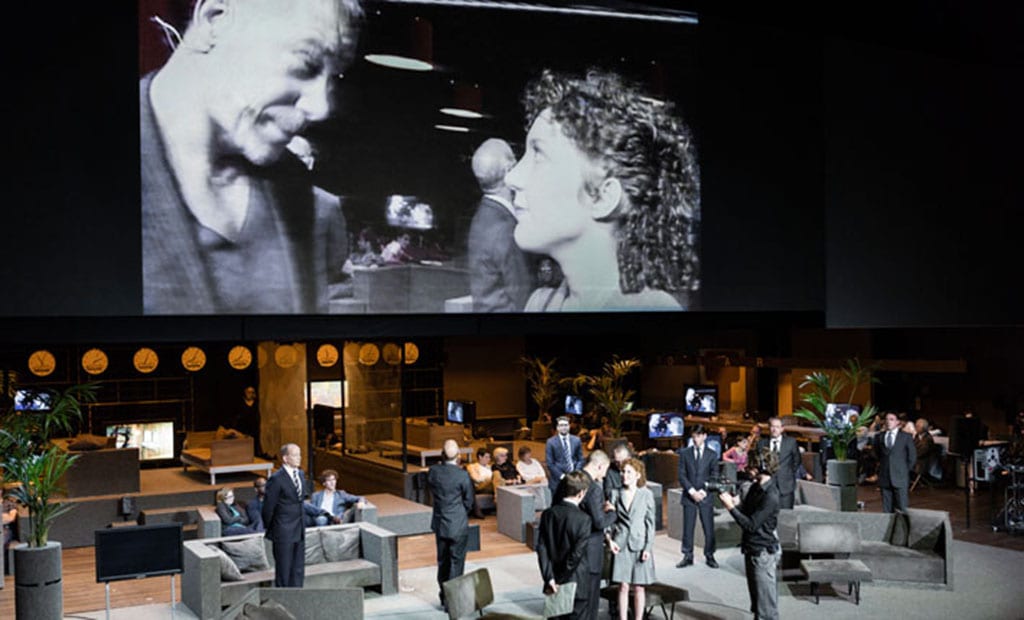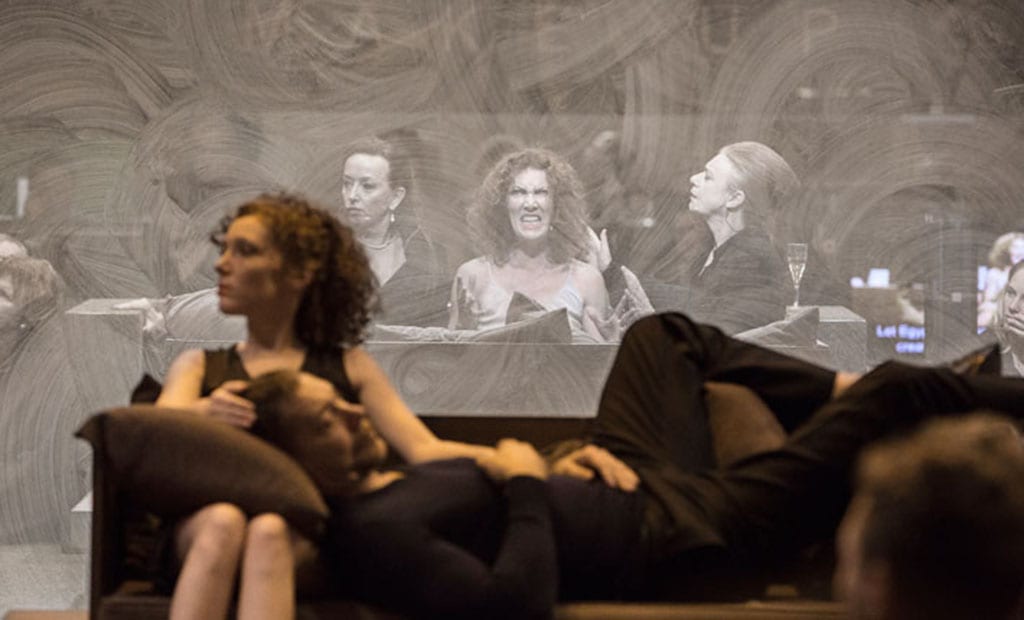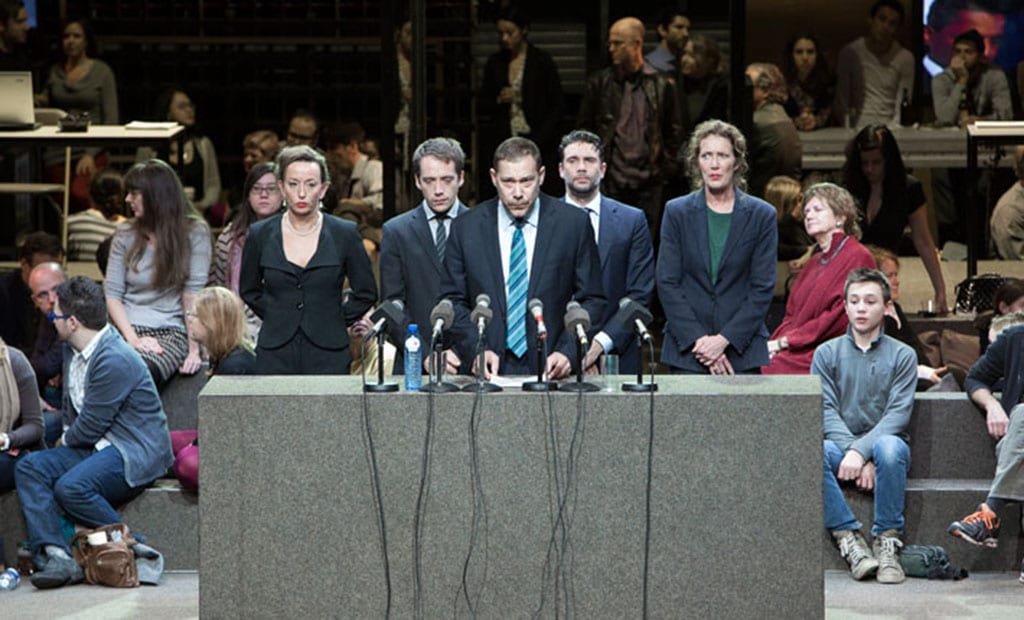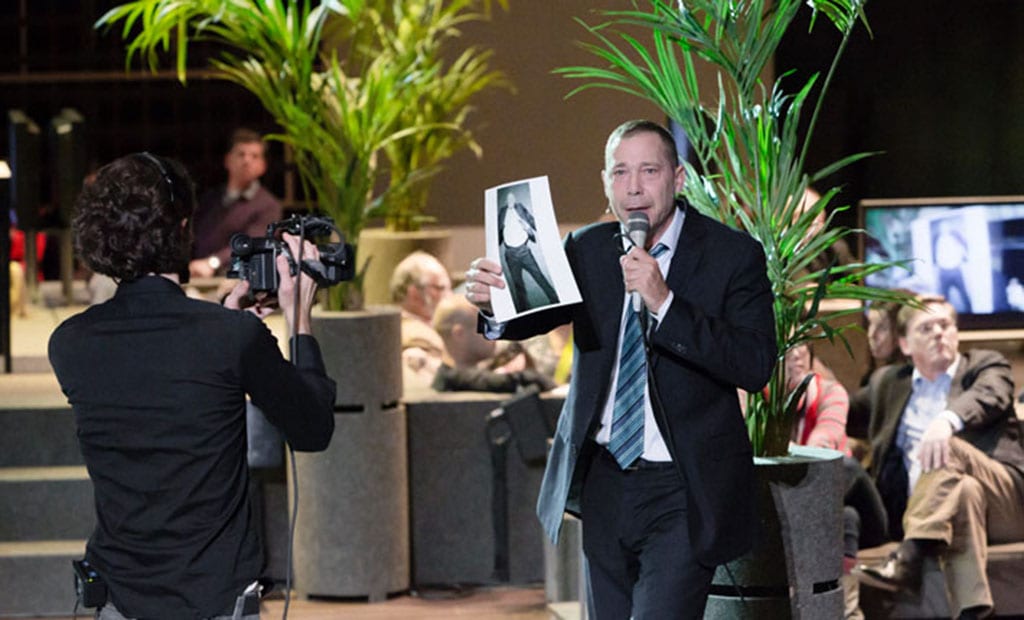Ivo van Hove’s adaptation of Shakespeare’s Coriolanus, Julius Caesar and Antony and Cleopatra is a total theatre experience. The Flemish director makes theatre that is larger than life, encompassing a myriad of experiences and viewpoints. As he admitted in one interview he is also not intent on exploring good and evil in his work, and it shows in his adaptation of Shakespeare’s plays: his theatre genius is unquestionable but I wonder if his interest is not limited to making beautiful, engrossing art. For all its innovation and impeccable acting his Roman Tragedies today come across (even if unintentionally) just a tad too bourgeois, too orderly, too clean. The production shows only the Western side of modern politics: no other voices are heard, well, they are relegated to TV screens where you can see occasionally documentary footage from the Middle East and Africa.
The stage comprises several plans, at the front at each end of the stage two identical percussion instruments sections are created where two musicians play live and create special sounds effects. Further back (left- and right-stage) there are various services for the audience and the actors: bars where you can purchase food and drink during the performance, a make-up station, information desk. There are sofas and TV screens everywhere, once the audience is invited on the stage, after only half an hour in the auditorium, you can choose to just sit in front of the TV and watch the production with a drink in your hand or if you are more curious you can try different seats to watch the actors from different vantage points. Several members of staff watch carefully the spectators on the stage, making sure they do not go where it could disturb the show, while the master of ceremony communicates different messages and directions to all the audience, most importantly he announces the so-called scene changes when Barbican crew enter the stage to reconfigure the furniture or bring props.
Roman Tragedies are a well-oiled machine designed to perfection which made me at times feel hollow, detached, unengaged. For the majority of the performance spectators on the stage are no more than ghosts to the actors who do not address you, touch you or even acknowledge your presence (this changes, but not in a significant way later on). The on-stage audience bears witness to political machinations of be-suited characters but they are completely silent, ignored and play no important role in the overall performance. Actors often perform quite far from each other without any eye contact although through clever filming they seem to be facing each other when you look at TV screens. Indeed live and recorded video dominates the whole performance. The screens are everywhere on stage so you can see close-ups of actors’ faces and ignore their performance on stage.
The performance starts with several minutes of live drumming which always signals war throughout the performance. Then the first play starts, Coriolanus, a story about famed Roman general who falls into disgrace and becomes a traitor because he would not bow to populist politics. It is a very compelling segment of Roman Tragedies, there are press conferences which turn into fist fights and secret meetings to influence political opponents, friends become enemies and enemies friends – that is the circular rule of politics in Coriolanus and anyone who tried to be principled and stand for what they believe would eventually fail.
Coriolanus played by Gijs Scholten van Aschat, is a tired politician, not interested in power games or the voters’ appreciation of him. His aloofness but also weakness (due to powerful influence over him by his ambitious mother) eventually leads to his death, the first of many in the production, shown stunningly in a carefully composed visual style which will be repeated in the production several times.
The second play, Julius Caesar provides the most compelling fifteen minutes of the production in which Mark Antony delivers his eulogy at Caesar’s funeral, following his death at the hands of Brutus and his fellow conspirators. Hans Kesting delivers one of the best performances you may see in theatre. He commands the whole stage and auditorium: there is no one who would not pay attention to his speech. From this moment Roman Tragedies belong to him, Brutus is an opponent easy to crush and his plight is completely overshadowed by the charisma of the politician extraordinaire, who will not stop at using the most audacious theatrics to gain power and influence his audiences.
When we get to Antony and Cleopatra segment of the production, the tone changes and serious politics are replaced with more comedy. The trio comprising of Cleopatra, Iras, Charmian and (female) Diodemes is almost a parody of Sex in the City: they giggle a lot, talk about men, drink champagne and dance when they feel like it. Cleopatra is neurotic and loud and this characterisation provides a stark contrast to female Octavius Caesar who is a woman with perfect control over her emotions and political plans. In fact due to profoundly changed gender dynamics Antony and Cleopatra is dominated by women, especially towards the end of this adaptation. The volatile, very close and toxic female and male friendships become a central theme. They end in multiple yet bloodless tragedies. Yet dead bodies are posed and showed on the screen. We watch political situations that result in violent deeds but Roman Tragedies is a world of designer sofas and expensive suits. Evil is banal.
Without any doubt, Roman Tragedies are one of the most accomplished adaptations of Shakespeare in European theatre: it is extraordinary, unmissable theatre. I only wish it engaged more with modern politics, make them less universal and more realistic because the theatre’s responsibility is to do more than creating unique theatre experiences.




